Rejection of violations in Jerusalem, US decision on Golan to dominate Arab summit agenda
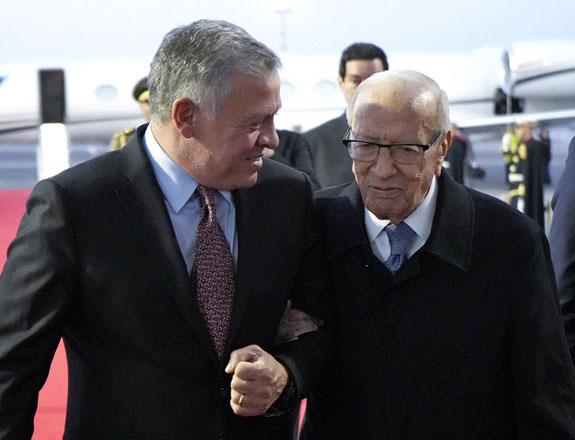
The Jordan Times
TUNIS — Renewed commitment to peace as a strategic option for ending the Arab-Israeli conflict and rejection of Israeli violations in occupied Jerusalem and the recent US decision to recognise Israeli sovereignty over the Golan Heights are to dominate the agenda of the 30th Arab summit, which will start in the Tunisian capital on Sunday.
His Majesty King Abdullah arrived in Tunis on Saturday to head the Kingdom’s delegation to the summit, where several thorny issues are to be discussed.
Tunisian President Beji Caid Essebsi received His Majesty upon his arrival at Tunis-Carthage International Airport, where an official reception ceremony was held, a Royal Court statement said.
The King met with several Arab leaders and heads of delegation ahead of the summit (see story on page 3).
One of the resolutions presented to the Arab leaders at the summit condemns US President Donald Trump’s decision recognising Israel’s sovereignty over the Golan Heights, stressing that the decision is a serious violation of the UN charter and relevant international resolutions that clearly ban the forceful annexation of land.
Heads of Arab states will stress that the US decision does not change the fact that the Golan is a Syrian territory that was occupied by Israel in 1967 and that it does not have any legal grounds or impact.
On Palestine, the Arab leaders will renew their commitment to the 2002 Arab Peace Initiative, stressing that comprehensive peace with Israel needs to be preceded by ending the Israeli occupation of the Palestinian and Arab territories that Israel occupied in 1967, including East Jerusalem, according to a copy of the draft resolutions, seen by The Jordan Times.
For peace with Israel to be attained, it needs to recognise the Palestinian state and the inalienable rights of the Palestinians, including their right to statehood, determination of their destiny and the right of return and compensation for Palestinian refugees, in line with internationally recognised UN resolutions, the Arab leaders will stress during the summit, in which 6,000 delegates from 21 countries are scheduled to participate.
Arab leaders will stress their rejection of any political or financial pressures on the Palestinians and the Palestinian leadership that seek to impose unfair solutions to settle the Palestinian issue.
Heads of Arab states will commit to taking measures to stand up to any decision by any country to recognise Jerusalem as the capital of Israel or relocate their embassies to the Holy City, according to the draft, and they will also stress their rejection and condemnation of any decision that seeks to alter the historic status of Jerusalem including the US decision on Jerusalem last year.
One of the resolutions will urge Brazil not to take any measures that seek to alter the legal status quo of Jerusalem to preserve its ties with the Arab states, while in another the leaders will also reject Australia’s decision to recognise West Jerusalem as the capital of Israel and renew their support to Palestine in facing the impact of the US recognition of the city as the capital of Israel.
The Arab leaders are also expected to condemn repeated violations by Israeli authorities and settlers against Al Aqsa Mosque.
On Syria, there were no direct resolutions or statements on reinstating the country’s membership in the Arab League after eight years of suspension, even as many Arab states have softened their opposition to Syrian President Bashar Assad.
The pan-Arab bloc froze Syria’s membership in November 2011 over the Syrian regime’s crackdown on protesters, which escalated into a civil war that killed hundreds of thousands of Syrians.
Arab officials at the summit said any decision to reinstate Syria’s membership in the Arab League must have consensus among all Arab states and be conditioned on putting an end to Iran’s interference in its internal affairs.
In this regard, the Arab leaders will stress that the sole solution to the Syrian crisis is an inclusive political solution that meets the aspirations of all Syrians, according to the draft.
In their summit, the Arab leaders will commend the EU and European parliaments for their stances in condemning Israeli settlement activities, recognising settlements as illegal and banning the financing of projects in Israeli settlements in occupied Palestinian territories.
On Iran’s interference in the internal affairs of Arab states, the leaders are expected to endorse a resolution stating that the relationship between the Arab countries and Iran are based on the “good neighbour policy” and refraining from using force or threatening to use force.
They will also condemn Iran’s interferences in the internal affairs of Arab states as a serious violation of international laws.
On Yemen, they are set to renew their commitment to preserving the unity of Yemen, its sovereignty and territorial integrity, while stressing their rejection of interfering in its internal affairs.
On Libya, the heads of Arab states will renew their support for efforts to preserve the unity and territorial integrity of the country.
Latest News
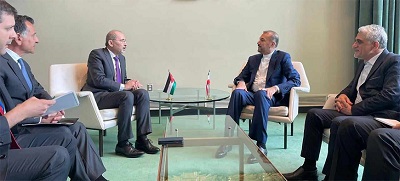 Safadi, Iranian counterpart discuss war on Gaza, regional escalation
Safadi, Iranian counterpart discuss war on Gaza, regional escalation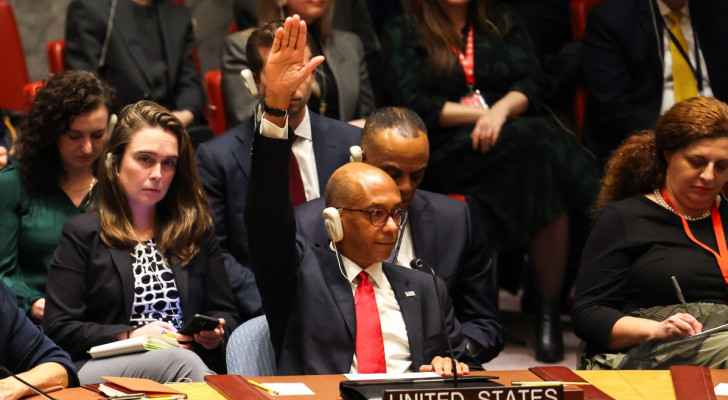 US vetoes Security Council resolution on full Palestinian UN membership
US vetoes Security Council resolution on full Palestinian UN membership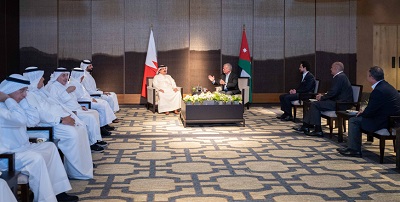 King, Bahrain monarch stress need to maintain Arab coordination
King, Bahrain monarch stress need to maintain Arab coordination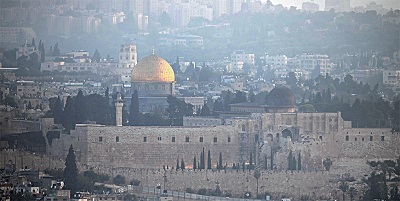 Security Council to vote Thursday on Palestinian state UN membership
Security Council to vote Thursday on Palestinian state UN membership Dubai reels from floods chaos after record rains
Dubai reels from floods chaos after record rains
Most Read Articles
- Jordan urges UN to recognise Palestine as state
- Senate president, British ambassador discuss strategic partnership, regional stability
- Temperatures to near 40 degree mark next week in Jordan
- JAF carries out seven more airdrops of aid into Gaza
- Safadi, Iranian counterpart discuss war on Gaza, regional escalation
- US vetoes Security Council resolution on full Palestinian UN membership
- UN chief warns Mideast on brink of ‘full-scale regional conflict’
- Biden urges Congress to pass 'pivotal' Ukraine, Israel war aid
- Google fires 28 employees for protesting $1.2 billion cloud deal with “Israeli” army
- Israeli Occupation strike inside Iran responds to Tehran's provocation, reports say